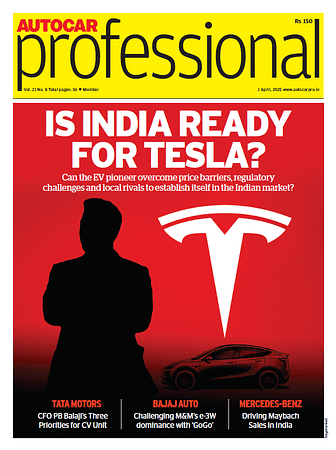India’s Luxury Car Market Leads EV Adoption, Outpacing Mass Segment: Mercedes-Benz India
Of the 51,000 luxury cars sold in the last financial year at an industry level, nearly 4,500 units were EVs. In comparison, while EV penetration in the mass-market passenger vehicle segment is growing, it still lags behind.
The adoption of electric vehicles in India’s luxury car segment is accelerating faster than in the mass-market passenger vehicle space, with EV penetration reaching as high as 10–12% of total sales for some premium brands, according to Mercedes-Benz India. With the entry of new automakers and the launch of additional EV models in the luxury space, the industry is expected to sustain electric vehicle adoption levels at around 10% going forward.
“The acceptance of EVs in the luxury segment is much stronger compared to the mass market. Currently, we have 8% EV penetration, and some other luxury brands are at 10% to 12%,” said Santosh Iyer, Managing Director and Chief Executive Officer of Mercedes-Benz India.
Of the 51,000 luxury cars sold in the last financial year at an industry level, nearly 4,500 units were EVs. In comparison, while EV penetration in the mass-market passenger vehicle segment is growing, it still lags behind. EV penetration in mass-market PVs was just around 2–3% last fiscal, even with total EV sales reaching approximately 1.2 lakh units.
Iyer credited the higher penetration in the luxury segment to better product-market alignment and greater customer readiness. “It’s not just about the numbers—it’s also the kind of EVs being sold. We focus on top-end electric vehicles, while others may offer entry-level EVs. But across the board, acceptance in luxury is stronger.”
While confident in the segment’s upward trajectory, Iyer stopped short of calling it an acceleration, citing a steady build-up in penetration over time. “From 2% to 2.5%, then 4.5%, and now 7–8%, we’ve seen consistent growth. Even without a massive portfolio expansion, we expect to sustain this momentum,” he said. “More products entering the segment will drive demand, but even with our current lineup, we’re seeing strong quarter-by-quarter progress.”
Mercedes-Benz India does not plan to significantly expand its EV offerings in the short term but expects organic growth to continue, supported by improved infrastructure and shifting consumer preferences.
In the financial year 2024–25, the German automaker’s EV sales surged by a robust 51%. This sales growth underlines the continued strong response to its entire portfolio, highlighted by the highest-ever customer deliveries for the EQS SUV. In the March quarter, the ‘Made in India’ EQS SUV 580 and EQS SUV 450 pushed EV penetration to 8% of total sales.
At the higher end of the spectrum, luxury EVs like the EQS Maybach Night Series and the G580 SUV with EQ Technology have garnered especially strong demand. Both models now carry waiting periods of up to 12 months, highlighting rising interest in high-end electric mobility.
In terms of overall sales, Mercedes-Benz India reported its highest-ever annual sales in FY25, delivering 18,928 new vehicles across the country. The German luxury automaker attributed this milestone to strong demand for top-end luxury models, its battery electric vehicle portfolio, and a revamped retail strategy. In the March quarter, the company retailed 4,775 new vehicles.
RELATED ARTICLES
Building in Silence: Ultraviolette CTO's Call for India’s Deeptech Backbone
As global supply chains face disruption and trade protectionism rises, Niraj Rajmohan, CTO and Co-founder of Ultraviolet...
Madhur Bajaj, Former Vice-Chairman of Bajaj Auto, Passes Away at 73
He was the first cousin of Rahul Bajaj, the former chairman and patriarch of the Bajaj Group, who passed away in 2022.
Harley-Davidson CEO Jochen Zeitz to Exit Role by Late 2025
Jochen Zeitz took over as CEO in 2020 and initiated project Hardwire, the company’s strategic plan for 2021-2025.






 10 Apr 2025
10 Apr 2025
 1572 Views
1572 Views





 Darshan Nakhwa
Darshan Nakhwa


 Autocar Professional Bureau
Autocar Professional Bureau


